For the 2025 school year, there are 2 public middle schools serving 569 students in Swain County Schools School District. This district's average middle testing ranking is 4/10, which is in the bottom 50% of public middle schools in North Carolina.
Public Middle Schools in Swain County Schools School District have an average math proficiency score of 43% (versus the North Carolina public middle school average of 48%), and reading proficiency score of 45% (versus the 50% statewide average).
Minority enrollment is 35% of the student body (majority American Indian), which is less than the North Carolina public middle school average of 56% (majority Black and Hispanic).
Overview
This School District
This State (NC)
# Schools
6 Schools
882 Schools
# Students
1,897 Students
494,023 Students
# Teachers
125 Teachers
31,644 Teachers
Student : Teacher Ratio
14:1
14:1
District Rank
Swain County Schools School District, which is ranked within the bottom 50% of all 320 school districts in North Carolina (based off of combined math and reading proficiency testing data) for the 2021-2022 school year.
The school district's graduation rate of 85-89% has increased from 80-84% over five school years.
Overall District Rank
#187 out of 325 school districts
(Bottom 50%)
(Bottom 50%)
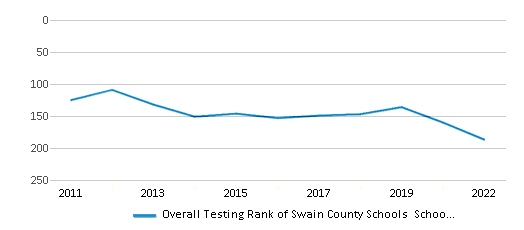
Math Test Scores (% Proficient)
47%
51%
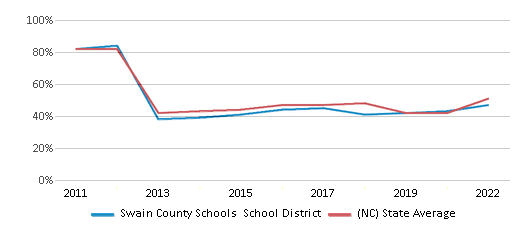
Reading/Language Arts Test Scores (% Proficient)
46%
50%
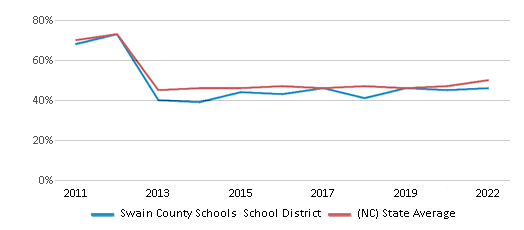
Science Test Scores (% Proficient)
58%
63%
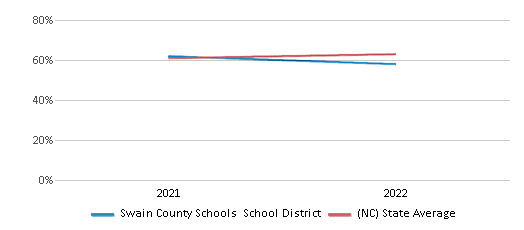
Graduation Rate
85-89%
86%
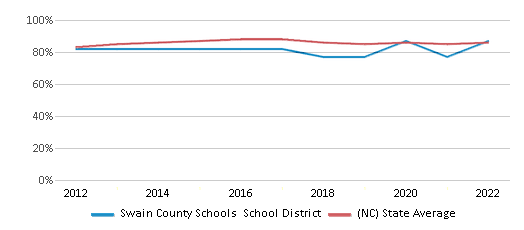
Students by Ethnicity:
Diversity Score
0.55
0.71
# American Indian Students
329 Students
5,633 Students
% American Indian Students
17%
1%
# Asian Students
13 Students
19,933 Students
% Asian Students
1%
4%
# Hispanic Students
140 Students
98,873 Students
% Hispanic Students
7%
20%
# Black Students
8 Students
122,407 Students
% Black Students
1%
25%
# White Students
1,210 Students
215,701 Students
% White Students
64%
44%
# Hawaiian Students
1 Student
646 Students
% Hawaiian Students
n/a
n/a
# Two or more races Students
196 Students
30,848 Students
% of Two or more races Students
10%
6%
Students by Grade:
# Students in PK Grade:
90
1,882
# Students in K Grade:
151
16,660
# Students in 1st Grade:
136
16,806
# Students in 2nd Grade:
126
17,050
# Students in 3rd Grade:
132
16,530
# Students in 4th Grade:
129
16,849
# Students in 5th Grade:
134
19,618
# Students in 6th Grade:
121
111,560
# Students in 7th Grade:
140
116,793
# Students in 8th Grade:
140
119,029
# Students in 9th Grade:
160
12,380
# Students in 10th Grade:
169
10,877
# Students in 11th Grade:
157
9,420
# Students in 12th Grade:
112
8,569
# Ungraded Students:
-
-
District Revenue and Spending
The revenue/student of $16,269 is higher than the state median of $11,187. The school district revenue/student has stayed relatively flat over four school years.
The school district's spending/student of $15,846 is higher than the state median of $11,612. The school district spending/student has stayed relatively flat over four school years.
Total Revenue
$31 MM
$17,307 MM
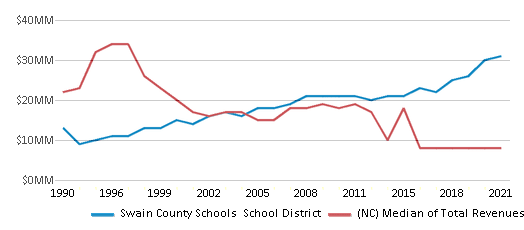
Spending
$30 MM
$17,964 MM
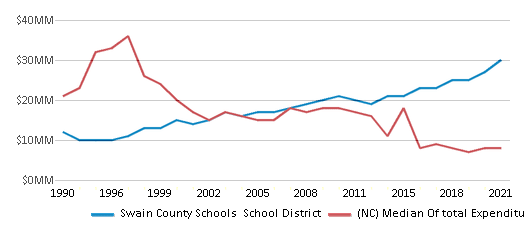
Revenue / Student
$16,269
$11,187
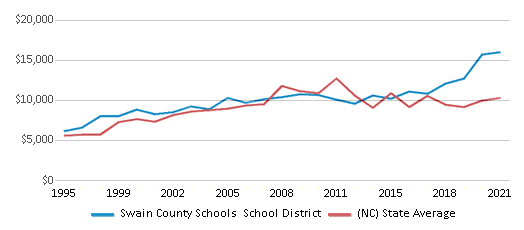
Spending / Student
$15,846
$11,612
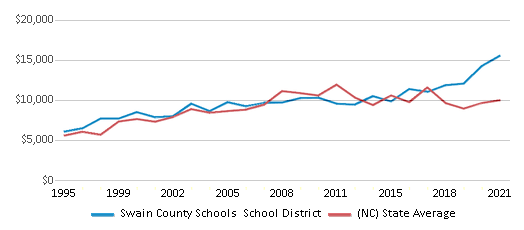
Best Swain County Schools School District Public Middle Schools (2025)
School
(Math and Reading Proficiency)
(Math and Reading Proficiency)
Location
Grades
Students
Rank: #11.
Swain County Middle School
(Math: 43% | Reading: 45%)
Rank:
Rank:
4/
Bottom 50%10
135 Arlington Ave
Bryson City, NC 28713
(828) 488-3480
Bryson City, NC 28713
(828) 488-3480
Grades: 6-8
| 467 students
Rank: n/an/a
50 Main Street
Bryson City, NC 28713
(828) 488-3129
Bryson City, NC 28713
(828) 488-3129
Grades: K-12
| 102 students
Recent Articles

What Is A Charter School?
Explore the world of charter schools in this comprehensive guide. Learn about their history, how they operate, and the pros and cons of this educational innovation. Discover key facts about charter schools, including admission policies, demographics, and funding, as well as what to look for when considering a charter school for your child.

10 Reasons Why High School Sports Benefit Students
Discover the 10 compelling reasons why high school sports are beneficial for students. This comprehensive article explores how athletics enhance academic performance, foster personal growth, and develop crucial life skills. From improved fitness and time management to leadership development and community representation, learn why participating in high school sports can be a game-changer for students' overall success and well-being.

February 05, 2025
Understanding the U.S. Department of Education: Structure, Impact, and EvolutionWe explore how the Department of Education shapes American education, from its cabinet-level leadership to its impact on millions of students, written for general audiences seeking clarity on this vital institution.





